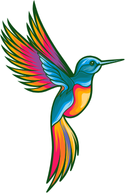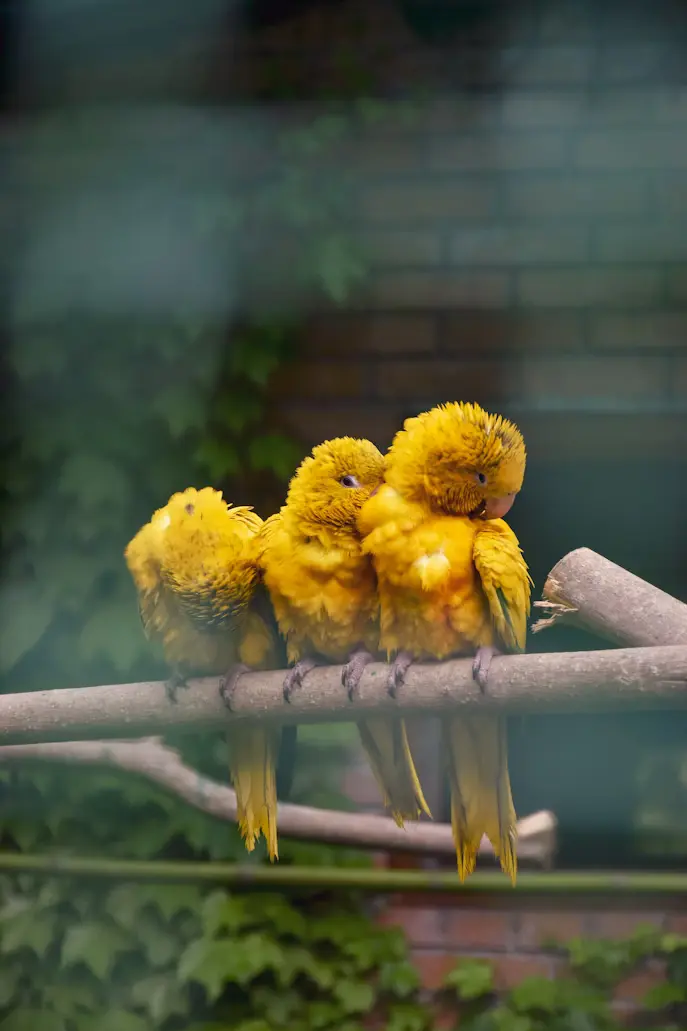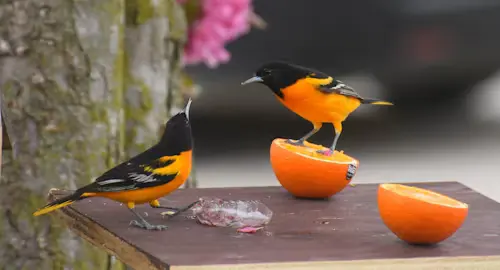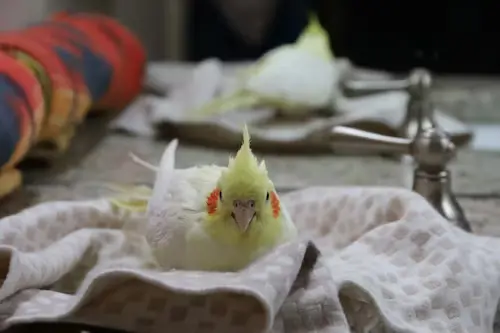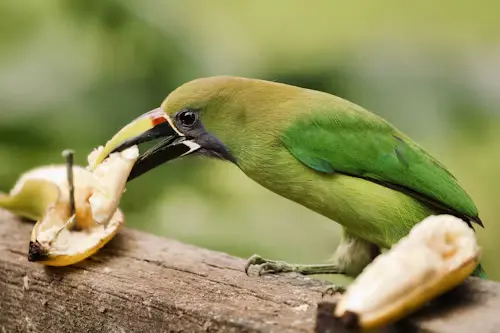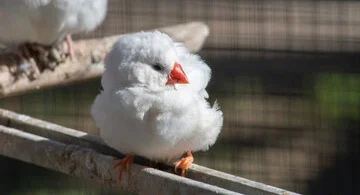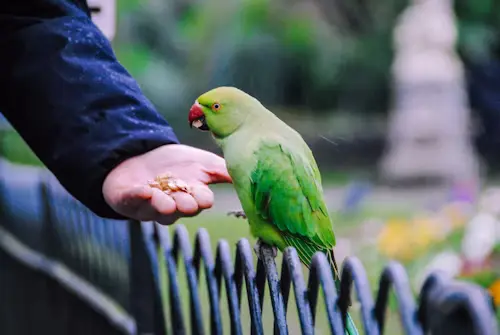Will Birds Eat Chia Seeds? How to Feed Them Right
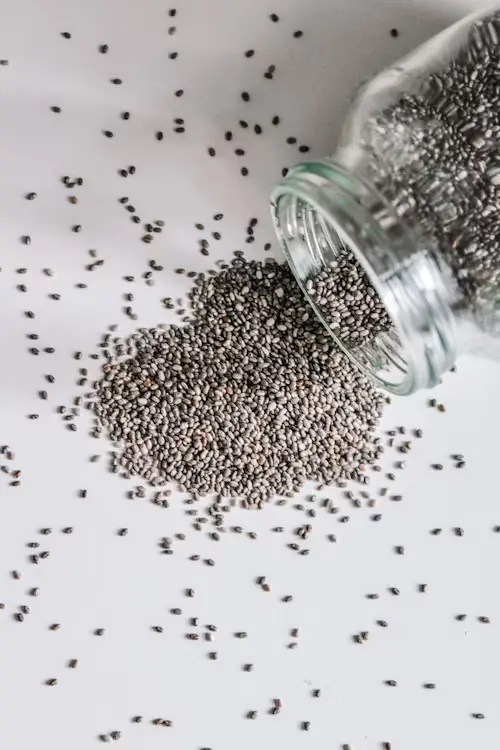
Remember that moment? You’re sprinkling chia seeds on your morning yogurt, and your curious cockatiel cocks its head, eyeing those tiny speckles with intense fascination. That flicker of avian curiosity makes you wonder: “Will birds eat chia seeds? Could this human superfood actually be good for my feathered friend?” If you’ve had these questions haunt your bird-parent mind (like they did mine when Kiwi, my rescue parrotlet, nearly dove into my chia pudding), you’ve landed in exactly the right spot. Let’s crack this seed wide open!
The short answer is a resounding yes – birds absolutely can eat chia seeds safely. But diving deeper reveals a world of nuance, from wild bird feeders to pet parrot diets. Understanding the how and why makes all the difference between nourishing your bird and unknowingly causing harm.
Table of Contents
Why Chia Seeds Are a Surprising Powerhouse for Birds
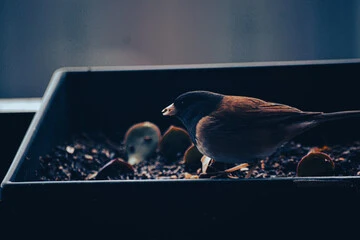
While trendy in human health circles, chia seeds (Salvia hispanica) are fundamentally just tiny seeds. And what eats seeds? Birds! It’s their natural evolutionary buffet. But chia packs a punch far beyond typical birdseed:
- Omega-3 Fatty Acids: Critical for brain function, reducing inflammation, and promoting glossy, healthy feathers. Unlike humans, birds can’t rely on fish oil!
- High-Quality Plant Protein: Supports muscle maintenance, feather growth, and overall cellular repair – vital for active, vocal birds.
- Soluble & Insoluble Fiber: Aids smooth digestion and regulates gut health, helping prevent issues like constipation.
- Calcium & Phosphorus: This powerful duo is essential for robust bone density, strong eggshells (for breeding females), and proper nerve function. Crucially, chia provides calcium without dairy, which birds can’t digest.
- Antioxidants Galore: Protects cells from damage and boosts overall immune resilience.
Chia Seeds vs. Common Seeds (Per 1 oz Serving):
| Nutrient | Chia Seeds | Flax Seeds | Sunflower Seeds | Sesame Seeds |
|---|---|---|---|---|
| Fiber (g) | 11 | 8 | 3 | 4 |
| Plant Protein (g) | 4 | 5 | 6 | 5 |
| Calcium (% DV) | 18% | 7% | 2% | 27% |
| Omega-3s (g) | 5.0 | 1.8 | Trace | Trace |
| Phosphorus (% DV) | 27% | 19% | 22% | 22% |
| Source: USDA FoodData Central |
The magic lies in that exceptional calcium and omega-3 combo – something many common birdseed staples lack. Especially crucial for indoor pet birds lacking direct sunlight and its Vitamin D benefits.
Wild Birds & Chia Seeds: Backyard Buffet Basics
Watching cardinals and finches discover chia seeds in your yard is pure joy! But feeding wild flocks needs careful consideration:
- Safety First: Chia seeds are non-toxic. A study by the Cornell Lab of Ornithology lists them as safe for wild birds.
- The Clean Kitchen Rule: Only feed wild birds raw, unsalted, unsweetened chia seeds directly from your pantry. Avoid seasoned, roasted, sugar-coated, or flavors designed for humans. Always check this list of dangerous foods for birds.
- Best Serving Styles:
- Whole & Dry: Mix them directly into your existing birdseed blend. They’re perfect for hopper, tube, or platform feeders. Cardinals, chickadees, house finches, goldfinches, grosbeaks, and even jays relish them.
- Sprinkled on Suet: Press chia lightly into suet cakes or homemade suet balls for a nutrient-dense energy boost, especially valuable in winter.
- Soaked Chia Gel: Add a tablespoon of dry chia seed to 3-4 tablespoons of water. Let it sit for 15 mins until a gel forms. Offer small globs in shallow dishes or mix it into bird-safe homemade bird dough or dough balls. Discard within 24 hours.
- Sprouted Power: Chia sprouts are edible goldmines! Rinse seeds daily on a damp paper towel until sprouted tails emerge (2-4 days). Position them in a safe spot near other feeders.
- Feed Smart: Start with small amounts alongside their regular diet to see which birds favor them. Keep feeders clean and dry to prevent mold in humid climates.
Feeding Chia Seeds to Pet Birds: Mastering the Method
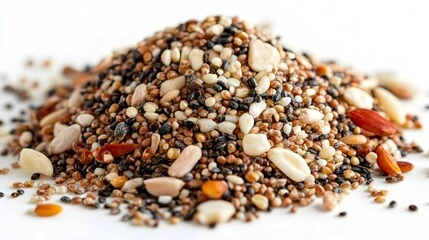
With pet birds, indulgence requires precision. Their circumcised lives demand mindful feeding to prevent obesity and maintain peak health:
- The Golden Rule: Moderation! Chia seeds are exceptionally energy-dense. For small birds (budgies, parrotlets, lovebirds), offer less than 1/4 teaspoon, 1-2 times per week. Medium birds (cockatiels, conures) can have up to 1/2 teaspoon, 2-3 times weekly. Larger parrots (African Greys, Macaws) can handle 1 teaspoon 3-4 times max. Treat chia like the potent nutrient bomb it is! Explore how oats play into the mix for healthy balance.
- Preparation is Key:
- Dry & Sprinkled: The easiest! Lightly sprinkle dry seeds onto your bird’s fresh chop, veggies, pellets, or whole grains. My parrotlet goes bonkers when I do this!
- Soaked Chia “Pudding”: A hydrating, fun texture. Mix 1 part seeds with 4-6 parts water (or unsweetened bird-safe herbal tea) for 15 mins until it gels. Offer tiny dollops mixed with softened veggies or fruit. Always remove uneaten wet food quickly.
- Ground & Blended: Grind dry chia seeds into powder (coffee grinder works) and mix into birdie bread batter, cooked grains like quinoa, oatmeal, or sprinkle onto moist veggies. Excellent for easy digestion.
- Sprouts: A powerhouse! Offer fresh chia sprouts daily. Ensure impeccable hygiene during the sprouting process (rinse thoroughly 2-3 times daily with cool water).
- Crucial Precautions:
- Hydration is Non-Negotiable: Ensure constant access to fresh, clean water. Chia’s soluble fiber absorbs moisture.
- Never Feed “Chia Pets”: Those decorative terra cotta novelties often involve paints, glues, or unknown seed treatments not suitable for consumption. It’s pure nostalgia, not food!
- Listen to Your Vet: Always consult your avian vet before making dietary changes, especially if your bird has health conditions.
“My Green Cheek Conure loves a tiny bit of chia gel mashed with a blueberry. He gets it maybe twice a week. His feathers look incredible!” – Reddit Parrot Owner
Are All Birds Suited? Species-Specific Chia Notes
- Parrots & Parakeets Overall: Generally excellent candidates when fed appropriately! Finches, Canaries, Budgies, Cockatiels, Conures, Lovebirds, African Greys, Amazons, Macaws. Start tiny!
- Finches & Canaries: Opt for ground chia or fine sprouts due to their tiny beaks.
- Parrotlets & Budgies: Small portions whole, sprouted or ground.
- Chickens & Ducks: Can enjoy chia sprouts or seeds mixed into feed as extra nutrition – boosts egg quality! But ensure they still get their primary layer feed.
- Pigeons & Doves: A safe, nutritious add-in.
- Baby Birds: Stick to formulas/pelage foods unless explicitly guided by a certified avian vet.
Beyond Seeds: Creative Recipes (Bird & You!)
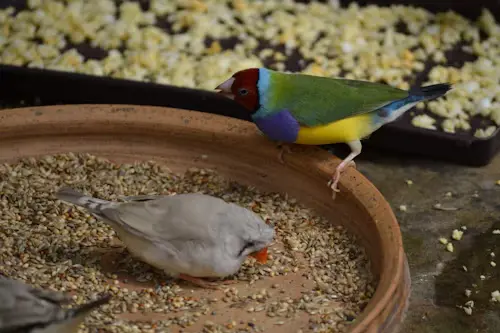
- Feather Fuel Birdie Bites:
- Mash 1/4 banana + 2 Tbsp cooked quinoa.
- Stir in 1 tsp finely chopped greens, 1/4 tsp chia seeds (dry or soaked).
- Form small balls, roll in crushed pellet powder.
- Offer immediately. Store leftovers in the fridge <3 hours.
- Hydration Hero Gel:
- Mix 1 tsp chia seeds with 1.5 Tbsp unsweetened cranberry juice + 1.5 Tbsp water.
- Allow to thicken until gelled.
- Stir in a pinch of finely grated carrot & zucchini.
- Serve a pea-sized dollop.
- Sprout Power Jar:
- Layer organic chia seeds on a damp (not soaking) paper towel in a shallow glass/ceramic dish.
- Cover loosely with plastic wrap with holes poked.
- Keep damp by misting lightly 2-3 times daily.
- In 2-4 days, offer fresh sprouts! Ranger your birds enjoy exploring the textures.
Frequently Asked Questions (Will Birds Eat Chia Seeds)
Q: Will birds automatically eat chia seeds if I put them out?
A:** Yes, most seed-eating birds will readily try chia, especially mixed into existing birdseed. Cardinals, finches, sparrows, and nuthatches are common fans. Their natural foraging instinct kicks in!
Q: Can chia seeds cause blockages in birds?
A: Unlikely when fed correctly. Dry chia expands when wet (forming a harmless gel), but birds’ digestive systems are designed to handle whole seeds and hulls. Proper hydration (always fresh water available!) is vital. Soaking before feeding further reduces any theoretical risk. Stick to safe quantities.
Q: Are store-bought ‘Chia Pets’ seeds safe for my parrot?
A: ABSOLUTELY NOT. Seeds for Chia Pet kits are not certified for animal consumption. They could be treated with fungicides, pesticides, or contain unknown additives. Purchase only human-grade, organic, raw chia seeds from trusted food stores for your birds.
Q: Do chia seeds replace a calcium supplement?
A: While an excellent calcium source (especially valuable for bird moms!), chia shouldn’t replace a vet-prescribed supplement, especially if your bird is laying eggs or has health concerns. It’s a fantastic dietary supplement, not a sole solution. Always inform your vet about dietary additions.
Q: How long does soaked chia last?
A: Chia gel for birds needs fast turnover. Remove uneaten soaked chia or chia gel within 2-4 hours max, especially at warmer room temperatures. Discard immediately. Bacteria grows rapidly in moist, nutrient-dense environments! Feed dry chia seeds are shelf-stable for ages.
The Tiny Seed Verdict: Go Forth & Sprinkle Safely!
So, will birds eat chia seeds? Resoundingly confirmed – from backyard songbirds discovering them at your feeder to your cherished companion parrot enjoying a sprinkle on breakfast chop! When sourced raw and unsalted, prepared thoughtfully (dry, soaked, sprouted, or ground), and fed strictly in moderation, chia seeds unlock a treasure trove of chia seeds bird diet benefits – especially vital calcium and mood-boosting omega-3s. Whether you’re feeding chia seeds to pet birds or simply looking to supercharge your wild bird sanctuary, this ancient superfood can be a game-changer.
Keen to try it? Start super small. Watch your bird’s reaction. Keep that water dish pristine. Tell us about it! What’s your bird’s reaction to chia seeds? Share your triumphs, pics, or questions below. Want more insights? Dive into our full Bird Food section for guides on oats, sprouting, feeding schedules, and exotic bird nutrition smackdowns! Because knowledge transforms an anxious “will they?” into a joyful “omigosh LOOK they LOVE it!”
